النوع الاجتماعي والشمول
يمثل النوع الاجتماعي والعمر والقدرات وغيرها من السمات الفردية أو المتعلقة بالسياق فرصًا وتحديات مختلفة لتقديم المساعدات النقدية والقسائم للأشخاص الذين يعانون من الأزمات بطريقة كريمة.
بين الجهات الفاعلة الإنسانية، هناك اعتراف متزايد بالاحتياجات والقيود المحددة للأشخاص ذوي القدرات المختلفة، وكبار السن، الأشخاص من مختلف الأجناس، وخاصة النساء، والأشخاص المتنقلين. وإلى جانب ذلك، هناك تقدير متزايد للحاجة إلى تدابير مصممة خصيصًا وحساسة تضمن إدماجهم بشكل فعال.
إن دعم احتياجات الأشخاص المتنوعين من خلال المساعدات النقدية والقسائم يتجاوز مجرد جعلهم مجموعة مستهدفة؛ بل يتعلق الأمر بالمشاركة الهادفة، والتصميم والتنفيذ الهادفين، وتعديل البرامج لتلبية احتياجات المجموعات المختلفة بكرامة. وتسير نهج شامل جنبا إلى جنب مع المساعدات التي تركز على الناس.
الأولويات الحالية
ستواصل شبكة CALP تشجيع الجهات الفاعلة في مجال المساعدات النقدية على توسيع نطاق تركيزها لتكون أكثر شمولاً وتدعم فهمًا أعمق لكيفية تجاوز المساعدات النقدية والقسائم إلى ما هو أبعد من فكرة “عدم إلحاق الضرر” نحو تلبية احتياجات مختلف الأشخاص بشكل مناسب وبطرق آمنة وكريمة.
سنعمل على رفع مستوى الخبرات والمبادرات المتعلقة بالمساعدات النقدية والقسائم والنوع الاجتماعي، والمساعدة النقدية الشاملة للأشخاص ذوي الإعاقة، والعمل مع مختلف الأعراق والهويات الثقافية، ومجموعات الأقليات، والأشخاص ذوي الهويات الجنسية المتنوعة، والفئات العمرية.
ستسعى CALP أيضًا إلى جعل عملها متاحًا قدر الإمكان.
محتوى متميز

فيديو التعلم المصغر: المساعدات النقدية والقسائم والنوع الاجتماعي
Blog Post
يُقدم هذا الفيديو نظرة عامة على العلاقة بين النوع الاجتماعي والمساعدات النقدية والقسائم (CVA) التي تتمحور حول دورة المشروع الإنساني، والتي تشمل: التقييم وتحليل الاستجابة: كيفية تعديل عمليات التقييم لتحقيق انعكاس أكثر...

نتائج جندرية أفضل في المساعدة الغذائية من خلال البرمجة التكميلية ومتعددة الوسائط
إرشادات وأدوات
اقُتبست ورقة النصائح هذه من تقرير البحث، «نتائج جندرية أفضل في المساعدة الغذائية من خلال البرمجة التكميلية ومتعددة الوسائط .»
سعت الدراسة إلى الإجابة عن »كيف يمكن لعمليات التصميم 1 والتنفيذ والمراقبة للمشاريع التي...
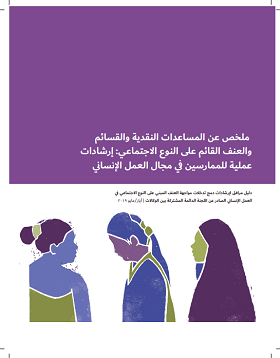
ملخص المساعدات النقدية والقسائم والعنف القائم على النوع الاجتماعي: إرشادات عملية للممارسين في مجال العمل الإنساني
إرشادات وأدوات
الغرض من ملخص المساعدات النقدية والقسائم (CVA) والعنف القائم على النوع الاجتماعي (GBV) هذا هو مساعدة الجهات الفاعلة في مجال العمل الإنساني والمجتمعات المتأثرة من الأزمات والنزاعات على: إدماج الحد من مخاطر العنف القائم...

المساعدات النقدية والقسائم (CVA) المراعية للنوع الاجتماعي توجيهات لضمان النهج المتبع ميدانًيا
إرشادات وأدوات
تبني هذه التوجيهات على طموح منظمة كير من خلال الممارسة والأبحاث والأدلة على المساعدات النقدية والقسائم، وتهدف إلى دعم تطبيق المساعدات
النقدية والقسائم المراعية للنوع الاجتماعي طوال دورة المشروع وعلى مستوى...

كيفية التخفيف من مخاطر العنف القائم على النوع الاجتماعي في المساعدات النقدية والقسائم
فيديو
المساعدة النقدية والقسائم هي أداة مهمة لمساعدة الأفراد المتضررين من الأزمات على الوقوف على أقدامهم. ولكن تمامًا مثل أي شكل آخر من أشكال المساعدة ، من الضروري التأكد من أنه لا يؤجج التوترات في الأسرة أو في المجتمع وأنه...

تعميم إدماج قضايا ذوي الإعاقة في برامج المساعدات النقدية والقسائم
عرض تقديمي
ما هو النهج القائم على الحقوق لذوي الإعاقة؟ كيف يمكن تعميم دمج المعاقين لضمان استجابات إنسانية أكثر شمولاً وفعالية؟ للإجابة على هذه الأسئلة الرئيسية، اجتمعت شبكةCALP، و CBMالعالمية، والمنتدى الأوروبي للإعاقة، والمنظمة...
القيادات المواضيعية
المستجدات
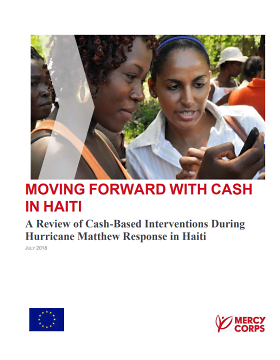
Moving Forward with Cash in Haiti: A Review of Cash-Based Interventions during Hurricane Matthew Response in Haiti
Case Study
Mercy Corps, with funding from European Civil Protection and Humanitarian Aid Operations (ECHO) has conducted an extensive review of lessons learned and contextual data, combined with key informant interviews and workshops to compile, analyse and present core lessons from the Hurricane Matthew cash-based...

The Grand Bargain Cash Meetings: what did we learn, how are we doing, where next?
Blog Post
After cash focal points from Grand Bargain signatory organisations gathered in Rome for the second annual meeting of the Grand Bargain cash workstream, we ask how much progress has been made towards commitments, and what remains to be done.
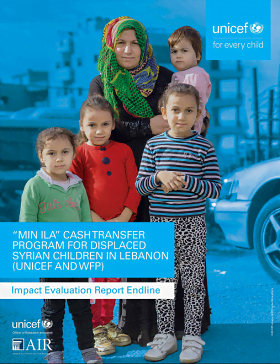
“Min Ila” cash transfer program for displaced Syrian children in Lebanon
Report
“Min Ila” is a cash transfer program that was implemented by UNICEF and the United Nation’s World Food Program (WFP) in coordination with the Ministry of Education and Higher Education (MEHE), between 2016 and 2018 covering two (and later three) Lebanese governorates. The program, also known as...

New Thematic Page on Gender, Protection and CTP
Blog Post
To realise the potential benefits of cash based assistance for everyone, there is need to foster dialogue between cash, gender and protection actors. Actors from different sectors need to work together, share experiences and learning, and address gaps and overlaps. This also requires improving...
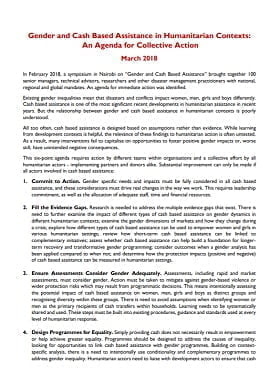
Gender and Cash Based Assistance in Humanitarian Contexts: An Agenda for Collective Action
Guidelines and Tools
In February 2018, a symposium in Nairobi on “Gender and Cash Based Assistance” brought together 100 senior managers, technical advisors, researchers and other disaster management practitioners with national, regional and global mandates. An agenda for immediate action was identified.
Existing gender...
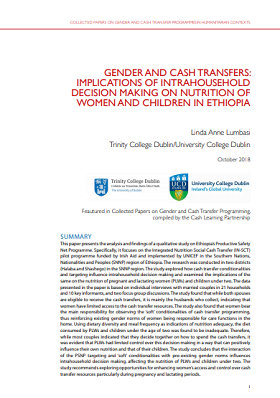
Gender and Cash Transfers: Implications of Intrahousehold Decision Making on Nutrition of Women and Children in Ethiopia
Case Study
From ‘Collected Papers on Gender and Cash Transfer Programmes in Humanitarian Contexts’. Existing gender inequalities mean that disasters and conflicts impact women, men, girls and boys differently. Cash-based assistance is one of the most significant developments in humanitarian assistance in recent...
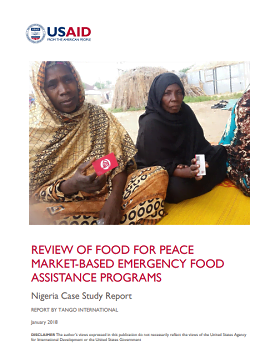
Review of Food for Peace Market-Based Emergency Food Assistance Programs: Nigeria Case Study Report
Case Study
Nigeria is an example of food assistance in a conflict situation in the Sahelian context. The response used information technology to deliver one of the more sophisticated applications of voucher programs. This case is a good example of proactive implementing partner (IP) mechanisms and monitoring systems...

Cash Week 2018: Event Report
Report
Cash Week 2018 was a series of events aimed at advancing issues, reflecting, and preparing for the future of cash and voucher assistance. The events, which took place in London and online from 15-19 October 2018, were intended to provide opportunities for: Networking and collaboration between the CALP...

Review of Food for Peace Market-Based Emergency Food Assistance Programs: Sierra Leone Case Study Report
Report
Sierra Leone represents a remarkable experiment in market-based emergency programming using unconditional cash transfers and some conditional cash transfers Sierra Leone reflects the challenges of providing food assistance in the wake of a major infectious disease epidemic. Food insecurity increased due...

Tackling the Integration of Gender-Based Violence Prevention and Response and Cash-Based Interventions
Report
From ‘Collected Papers on Gender and Cash Transfer Programmes in Humanitarian Contexts’. Existing gender inequalities mean that disasters and conflicts impact women, men, girls and boys differently. Cash based assistance is one of the most significant developments in humanitarian assistance in recent...

Review of Food for Peace Market-Based Emergency Food Assistance Programs: Zimbabwe Case Study Report
Report
Zimbabwe reflects the recent Southern African drought crisis during a period of a regional El Niño-related drought and a national cash crisis. The United States Agency for International Development (USAID) Office of Food for Peace (FFP) funded a mix of programming between fiscal years 2011 and 2015,...
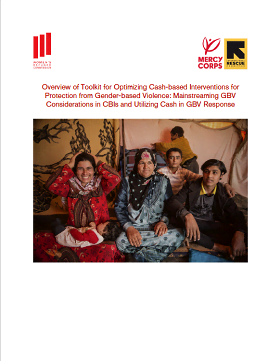
Toolkit for Optimizing Cash-based Interventions for Protection from Gender-based Violence
Guidelines and Tools
Efforts to prevent and respond to GBV should be a priority for all actors in all humanitarian response operations from the very start. By mainstreaming GBV considerations in CBIs throughout the program cycle and by utilizing cash within GBV case management services, cash can be optimized as a tool to...
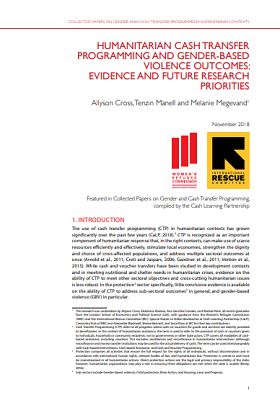
Humanitarian Cash Transfer Programming and Gender-based Violence Outcomes: Evidence and Future Research Priorities
Report
From ‘Collected Papers on Gender and Cash Transfer Programmes in Humanitarian Contexts’. Existing gender inequalities mean that disasters and conflicts impact women, men, girls and boys differently. Cash based assistance is one of the most significant developments in humanitarian assistance in recent...
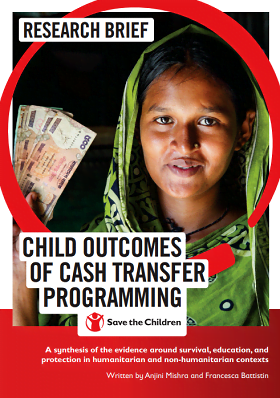
Child Outcomes of Cash Transfer Programming: Research Brief
Report
Humanitarian emergencies are increasing in both frequency and duration. It is evident that children bear the brunt of these situations and that these experiences have long-lasting effects on their development and future. The figures for the number of children affected by humanitarian emergencies are...

Cash Transfer Programming in Somaliland
Report
This report brings together reflections from a one-day learning event which took place in Hargeisa in March 2018. Participants reflected on what aspects of cash transfer programming worked well in the 2017 response and what needs to be improved going forward. In addition, there was a discussion about the...

“Breaking Barriers to Girls’ Education by Breaking Cycles of Poverty” Cash Transfers in South Sudan: A Case Study
Case Study
From ‘Collected Papers on Gender and Cash Transfer Programmes in Humanitarian Contexts’. Existing gender inequalities mean that disasters and conflicts impact women, men, girls and boys differently. Cash based assistance is one of the most significant developments in humanitarian assistance in recent...
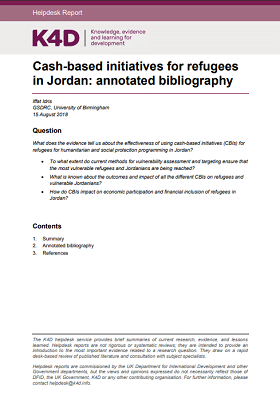
Cash-Based Initiatives for Refugees in Jordan: Annotated Bibliography
Report
The available literature tells us little about the effectiveness of targeting of cash-based initiatives (CBIs) for refugees in Jordan. However, it suggests there are positive impacts on food security for refugees, their ability to pay for rent and utilities and their psycho-social well-being, as well as...

Child Outcomes of Cash Transfer Programming: Appendix 1
Report
This is an appendix to the document “Research brief: Child outcomes of cash transfer programming. A synthesis of the evidence around survival, education and protection in humanitarian and non-humanitarian contexts”. This appendix contains the list of studies that were reviewed, with information on...

Child Outcomes of Cash Transfer Programming: Appendix 2
Report
This is an appendix to the document “Research brief: Child outcomes of cash transfer programming. A synthesis of the evidence around survival, education and protection in humanitarian and non-humanitarian contexts”. This appendix contains a summary of the available evidence per each outcome of...
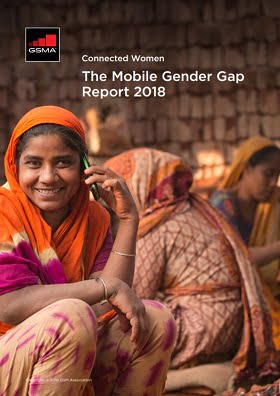
The Mobile Gender Gap Report 2018
Report
This report reveals for the first time the magnitude of the gender gap in mobile internet use across low- and middle-income countries, as well as highlighting the persistent gender disparity in mobile ownership and the barriers to ownership and use. Findings from this report are based on the results of...



